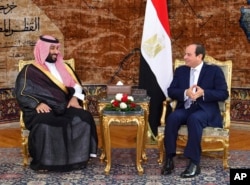Saudi Crown Prince Mohammed bin Salman is making a high-profile visit to Riyadh's major Arab allies before heading on to the G-20 summit in Buenos Aires at the end of the week.
After visiting Bahrain, the United Arab Emirates and Egypt, the crown prince went to Tunisia, where protesters denounced him for his alleged involvement in the killing of a Saudi journalist.
Members of civil society and women's groups chanted slogans against Crown Prince Mohammed in the center of the Tunisian capital, Tunis. They blamed him for the brutal killing of journalist Jamal Khashoggi by Saudi intelligence agents at Riyadh's consulate in Istanbul last month. Saudi Arabia has said the crown prince had no prior knowledge of the killing.
The crown prince's visit Tuesday went ahead, despite calls from Tunisian journalists to cancel his invitation. Tunisian President Beji Caid Essebsi defended his decision to welcome Crown Prince Mohammed.
In Cairo, small crowds of Egyptian supporters chanted slogans in favor of Crown Prince Mohammed, as government officials, including President Abdel Fattah el-Sisi, gave him a strong welcome, in what was being billed as his sixth visit to the country since his father became king in 2015.
The crown prince last visited Egypt in March to sign economic agreements, including those pertaining to a bridge between the Sinai and the Saudi mainland, a joint economic zone, and efforts to join the electricity grids of both countries.
The Saudi daily Asharqalawsat said Riyadh was the largest Arab investor in Egypt, with trade between the two countries surpassing $7.3 billion in 2017. Cairo and Riyadh also cooperate militarily in patrolling vital shipping lanes in the Red Sea and in Yemen. Egypt does not, however, have ground troops in Yemen.
Washington-based Gulf analyst Theodore Karasik told VOA that Crown Prince Mohammed's visit was aimed at garnering geopolitical support for Riyadh in regional conflicts, including the economic embargo against Iran.
“The visit to Tunisia is really about Iran and guaranteeing that Tunisia is on Riyadh's side when it comes to confronting Iran,” he said.
Hilal Khashan, a political science professor at American University of Beirut, said the Saudi crown prince's visit to the region was aimed at telling his domestic audience that he was given a strong welcome by the kingdom's Arab allies.
"The Saudi media will focus on the official reception,” Khashan said. “As far as [the crown prince] is concerned, he will be sufficiently satisfied with the outcome of the visit. Civil society does not count in the Arab region, so he is not really expecting a warm reception by the people. He is focused on the ruling elite with whom he shares the same political values."
Khashan said he thought the crown prince was likely to survive the political storm that followed the killing of Khashoggi and that the issue was gradually losing steam in the Arab media. He noted that many pundits predicted the downfall of Syrian President Bashar al-Assad after conflict broke out in 2011, but the Syrian president went on to survive the storm.





